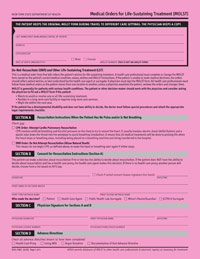End of life care is never easy to talk about, but it is one of the most important and overlooked parts of any true estate plan.
All of my clients who come in “for a will” always walk out with a health care proxy and a living will as well. A health care proxy designates an agent to make decisions on behalf of the principal, or usually at that time, the patient, after two physicians concur that the patient lacks medical decision-making capacity. A living will states the client’s wishes to the agent so that the agent will act in accordance with them.
New York has a little known form known as the MOLST form when it comes to a seriously ill person who may die in the next year. This is not a form an attorney can fill out for a client, only something we as attorneys can push a client to fill out with their doctor. In my opinion it is a mandatory form to help guarantee that a person’s wishes are fulfilled as some of the most trying times lay before them. As long as this person has the ability to make medical decisions regarding life sustaining treatment, a MOLST form will list exactly what they want and do not want done to them: resuscitation, intubation, mechanical ventilation, hospitalization. It has advanced to the point where the form has gone electronic, found at www.NYSeMOLSTregistry.com, so that it can be easily accessed.
There are no lawyer secrets here, in fact I wish this form was not such a secret at all. When someone is entering a time where palliative care is being considered or is in the near future start reading about the MOLST document here and you can even bring the document into your doctor’s office, if she hasn’t heard of it, found here.
The two best aspects about the MOLST form that jump out at me are one, it cannot be over-riden by a health care agent’s sole wishes. This helps guarantee a patient’s wishes – this is paramount when it comes to end of life decisions. Secondly, and equally as important, it eases the burden of the family around the patient. In those two weeks when life is incredibly hard for everyone a simple piece of paper shoulders the burden of the hardest decisions.
I’m happy to answer any questions that I can about this topic because I truly believe in the importance of it.

